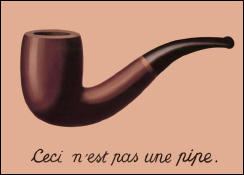
It's like when Wily Coyote paints that tunnel on the cliff face. That isn't a tunnel. It looks like one, but when you bear down at a full sprint and slam into it, the reality presents itself that it's solid rock.
C. S. Lewis does something very similar with his 1942 Christian fiction masterpiece, The Screwtape Letters. He presents a story about a devil named Screwtape, who is advising his nephew, junior tempter Wormwood, on the best tricks of the trade, how to pull people away from their faith and covert their victims (sleekly called 'patients' by the author) to the 'Father below.' Lewis uses an interesting literary tool. The story takes the form of a series of letters from the 'affectionate uncle' Screwtape, advising Wormwood on methods of securing the damnation of the patient, undermining faith and promoting sin, interspersed with observations on human nature and Christian doctrine. We do not see Wormwood's letters to Screwtape, but the contents can be inferred from Screw tape’s replies. We follow the success and failures of the junior tempter has his earthly subject goes through many phases of mortal life.
This book, at first glance, appears to be a whimsical look at faith from the perspective of the devil. But upon further inspection, it becomes a slyly crafted criticism of Christian life in the modern era.
Wikipedia states the following about the work:
The irony of the tale is that Wormwood's blundering efforts are utterly unable to prevent the soul's salvation, while Screwtape seems incapable of comprehending or acknowledging true human virtue when he sees it.
After the first letter, the Patient converts to Christianity, and Wormwood is given a severe rebuking and threatened with the "usual penalties" at the House of Correction for Incompetent Tempters. Wormwood's task is now to undermine the patient's faith as well as to tempt him to explicit sins which may result in his ultimate damnation. Screwtape explicitly tells Wormwood that the gentle, sliding slope of habitual small sins is better than any grandiose sin (presumably murder, rape, sexual immorality, etc.) for the devils' purposes in terms of damning a patient. Screwtape also notes that conventional churchgoing is so boring that the Patient will soon tire of it.
Lewis' use of this 'correspondence' is both varied and hard-hitting. With his usual unexpected mix of lenient and hard-line theology, Lewis covers areas as diverse as sex, love, pride, gluttony, and war. He depicts intellectuals as largely under Satan's influence, especially in regards to the "Historical Point of View."
Early in the book, Uncle Screwtape admonishes his nephew for allowing his patient to convert to Christianity. It is then that Lewis weaves his finest review of Christian society as he (or more accurately as Screwtape) sees it. He shows the current idea of church in the same way Magritte presents the pipe in his painting. This is not the Church. The Church is the massive, embodiment of Jesus Christ that lives and breaths and stretches through time and is constantly evolving and changing and growing. It works towards the inevitable future when the Kingdom comes.
Screwtape writes:
One of our great allies at present is the Church itself. Do not misunderstand me. I do not mean the Church as we see her spread out through all time and space and rooted in eternity, terrible as an army with banners. That, I confess, is a spectacle which makes our boldest tempters uneasy.
But fortunately it is quite invisible to these humans. All your patient sees is the half-finished, sham Gothic erection on the new building estate. When he goes inside, he sees the local grocer with rather an oily expression on his face bustling up to offer him one shiny little book containing a liturgy whidh neither of them understands, and one shabby little book containing corrupt texts of a number of religious lyrics, mostly bad, and in very small print.
When he gets to his pew and looks round him he sees just that selection of his neighbors whom he has hitherto avoided. You want to lean pretty heavily on those neighbors. Make his mind flit to and fro between an expression like 'the body of Christ' and the actual faces in the next pew. It matters very little, of course, what kind of people that next pew really contains. You may know one of them to be a great warrior on the Enemy's side. No matter. Your patient, thanks to Our Father Below, is a fool. Provide that any of those neighbors sing out of tune, or have boots that squeak, or double chins, or odd clothes, the patient will quite easily believe that their religion must therefore be somehow ridiculous.
A church can be a good and wonderful place, a place where the warmth and love of Jesus Christ stretches out and pulls people in. A church can be a place of comfort, healing, refuge and shelter. But too often church becomes a freeze frame, a fragment plucked from the stream of continuum of the Gospel, the All-powerful redemptive movement of Christ Jesus, started on the Cross and finished on the Day of Judgment. People become more focused on whom to let in or out of the doors of church and never let Church into them. They are about the business of maintaining a church and never get to the business of maintaining the Church.
A church can be magnificent. Unfortunately, often times we find it in a slumber, locked in a short-sighted malaise of its own importance and own business and it misses the amazing miracle that exists all around. Jesus Christ is big and awesome and everywhere. Revival is in the air!!! (stay tuned)

No comments:
Post a Comment